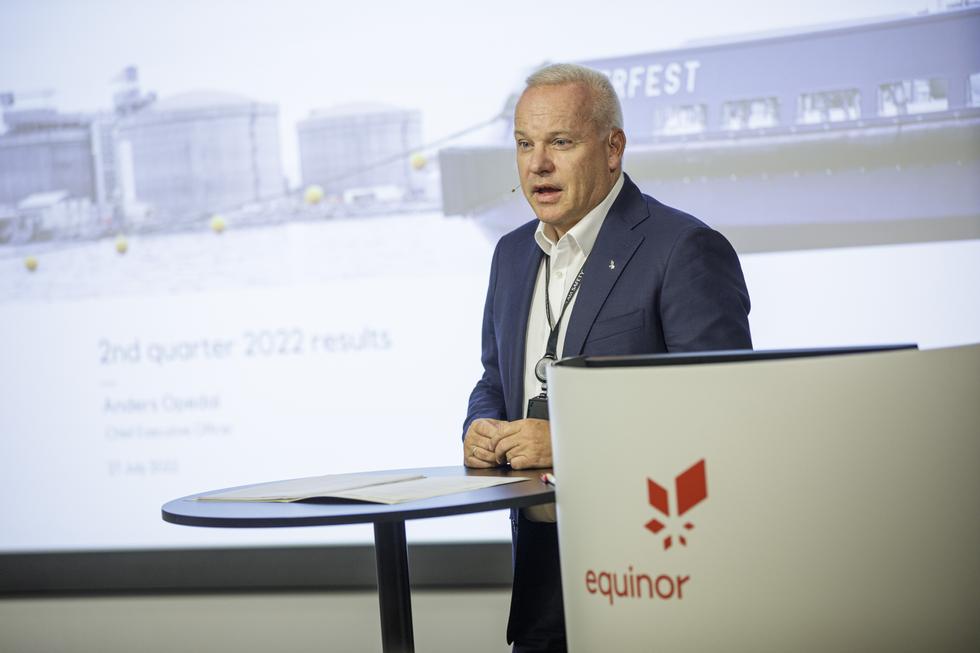Equinor and Ithaca Energy will continue development of the Rosebank field in the UK and invest more than NOK 41 billion in phase 1.
British authorities went through the North Sea Transition Authority (NSTA) on Wednesday announced that they give permission for field development.
Uplift, which is behind the StopRosebank campaign, sued and demanded that the agreement be cancelled.
– Equinor should listen to criticism like they did around Wisting and Bay du Nord in Canada. Rosebank is a disaster for the climate, a mockery of the British taxpayers who have to subsidize this, and the Norwegian public who once again see their state-owned oil company continuing with risky foreign investment, said Tessa Khan, head of Uplift.
Frode Pleym is the head of Greenpeace Norway Photo: Alf Simensen / NTB
see more
It is thought to be the UK’s largest oil field yet to be extracted, and this summer there were huge demonstrations against plans for development in the UK.
Ask the government to intervene
In the UK debate, tax breaks for Equinor and its partners are estimated at almost NOK 50 billion.
– There are many reasons to believe that Equinor’s activities will tarnish Norway’s international reputation, as the company puts profits ahead of climate and environmental interests, said Karoline Andaur, secretary general of the WWF World Wildlife Fund.
He pointed out that the state is Equinor’s biggest owner.

Sharp decline in Equinor’s earnings
– We are now waiting for the state to use its proprietary powers to take action and change the composition of the board as a consequence of this decision, Andaur said.
NTB has asked the government for comments on this matter.
– The fact that Equinor is starting up Britain’s largest undeveloped oil field in the midst of the climate crisis proves that promises of a green transition are a lie, says Frode Pleym, head of Greenpeace.
– Big protest
The Norwegian Nature Conservation Association called it a betrayal of future generations. Leader Truls Gulowsen indicated that the 1.5 degree target was set to be achieved.
– Then there is no longer any room to develop new oil fields, and especially large polluting oil fields like Rosebank. Equinor still expects big protests against this crazy project, Gulowsen said.
In December, 130,000 signatures were collected in a campaign against the pitch being handed to Prime Minister Rishi Sunak. There were also several large demonstrations and rallies against the development.
MDG co-chair Ingrid Liland called it a sad day.

Secretary General Karoline Andaur of the WWF World Wildlife Fund calls on countries to intervene after the Rosebank decision Photo: Javad Parsa / NTB
see more
– Through the announcement of ownership of Vestre and the government, this has strengthened expectations regarding the climate. It still appears to be a lie that state-owned Equinor is giving up on climate targets and investing in anti-climate projects around the world, he said.
SV’s Lars Haltbrekken called on the government to ensure that Equinor invests in more renewable energy.
– It is very serious that we have a state-owned oil company working against the country’s climate goals, he said.
– Significant ripple effect
Geir Tungesvik executive director for projects, drilling and acquisitions at Equinor said the development of the Rosebank field would help strengthen the company’s position as a broad energy partner for the UK and increase energy supplies in Europe.
– Rosebank offers the opportunity to develop fields on the UK continental shelf that will have a significant ripple effect across Scotland and the UK, Tungesvik said in a press release.
Equinor owns 80 percent of the development after increasing its stake this spring.
Rosebank Farm is located approximately 130 kilometers north west of the Shetland Islands approx. depth 1100 meters. Recoverable resources are estimated at more than 300 million barrels of oil for stages 1 and 2, while the estimate for stage 1 is 245 million barrels of oil.
(© NTB)

“Subtly charming web junkie. Unapologetic bacon lover. Introvert. Typical foodaholic. Twitter specialist. Professional travel fanatic.”







